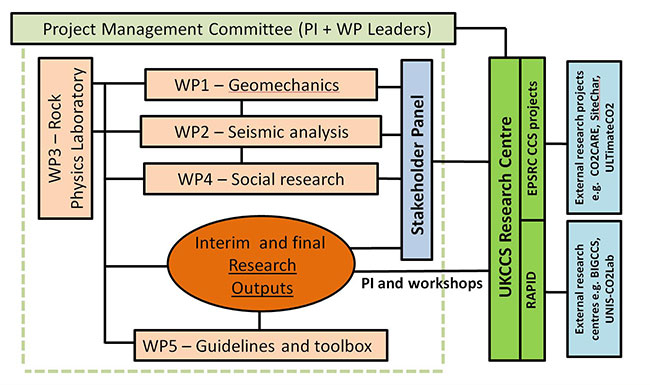Project management
The DiSECCS consortium is small, and a straightforward project structure has been designed to deliver timely and controlled management of project activities (figure 2). Project management is via the project management committee and the stakeholder panel, who together will oversee implementation of the project research programme within the terms of the DiSECCS collaboration agreement.
Principal investigator
The principal investigator (PI) is Dr Andy Chadwick (BGS), supported by BGS administrative and financial systems. BGS management systems are accredited to ISO9001:2000. The principal responsibilities of the PI include inter alia:
- contract preparation and negotiation with the Engineering and Physical Sciences Research Council (EPSRC) including defining the terms of reference for the project management committee
- developing and finalising the project collaboration agreement
- project preparation, start up and closure, including document control
- communication and contract management with the EPSRC and with the project partners via the collaboration agreement
- financial management including distribution of payments to partners
- chairing of meetings
- financial reporting to EPSRC
- scientific progress reporting via the UKCCS research centre (UKCCSRC) annual report
- control of intellectual property issues and obligations
Project management committee
The project management committee (PMC) comprises the PI (as Chair) and the work package leaders. It is collectively responsible for the main, day to day executive management of the project. Exact terms of reference are to be agreed with the EPSRC, but it is anticipated that the PMC will:
- develop and maintain the project monitoring strategy
- ensure effective and timely scientific co-ordination between work packages
- maintain quality control on research outputs
- monitor budgets
- organise project meetings (kick off and final project meetings, PMC meetings and teleconferences, project stakeholder panel workshops, ad hoc technical meetings, UKCCSRC science sessions)
- manage interfaces with the UKCCSRC
- manage scientific external interfaces including review/update the user engagement strategy
- monitor project risks and design appropriate mitigation actions if required
A key responsibility of the PMC is to work closely with the stakeholder panel. Duties will include inter alia the supply, in a timely manner, of progress reports, scientific information, research outcomes and items for specific review and advice.
Stakeholder panel
The stakeholder panel (SP) comprises DECC-EDU, BP Alternative Energy Ltd and Statoil. The SP will perform a key advisory and steering role in the project by providing perspectives on the real-world requirements of storage site operators and national regulators and how these may evolve with time. They will liaise closely with the PMC, via regular reviews of scientific progress, attending the kick off and closure meetings, the stakeholder workshops and, as appropriate, ad hoc technical and UKCCSRC meetings and workshops. Individual specialists from the stakeholder organisations may be invited to specific project technical meetings to provide inputs on specific scientific or technical topics.
Work package leaders
The work package (WP) leaders occupy important posts in the project structure. They are responsible for the co-ordination and delivery of all the technical and scientific work within their respective WP. This will include monitoring the progress and ensuring the timely completion of all tasks within the work package and appropriate reporting to the PMC.
WP1 leader: Dr Doug Angus (Leeds University)
WP2 leader: Dr Mark Chapman (Edinburgh University)
WP3 leader: Dr Angus Best (NOC)
WP4 leader: Dr Sarah Mander (Manchester University)
WP5 leader: Dr Andy Chadwick (BGS)
Project meetings
Project meetings will be a key element in maintaining scientific co-ordination, developing synergies within the project research activities and disseminating results. A range of meetings is planned (see also the workplan document):
- project kick off and closure meetings (start and end of project, including SP)
- project technical workshops (annual)
- stakeholder six-monthly online/Skype meetings with presentations (attended by SP and PMC)
- stakeholder workshops (annual, attended by SP and PMC)
- UKCCSRC science sessions (annual)
- PMC telephone/Skype conferences (monthly)
- PMC face-to-face meetings (annual, incorporated into technical workshops)
- ad hoc technical meetings (scientists and stakeholder specialists as required)
External interfaces
External interfaces will be a strong priority for DiSECCS. A strategy for engaging potential users will be developed at the start of the project by the PMC and the SP and will be reviewed and updated annually, incorporating advice from the SP. A very strong interface with UKCCSRC is anticipated, via the WP leaders who will be UKCCSRC members. The PI, who is research area champion for monitoring, will provide a more formal link and will feed results into the ongoing research and pathways to impact delivery (RAPID) exercise. Tony Espie (BP) from the SP is also on the UKCCSRC board and will further strengthen links.

